Homemade lemon vinegar is a great all-purpose cleaner. Adding citrus peels cuts the harsh smell of vinegar replacing it with a fresher scent.
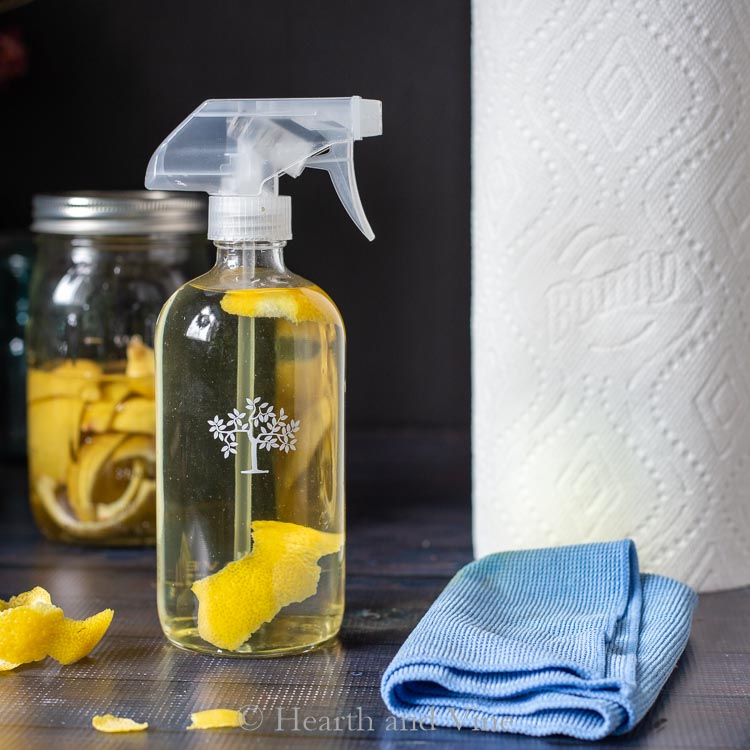
I use a fair amount of lemons when cooking and entertaining. I hate to see the peels or the fruit themselves go to waste so I try to use them in different ways.
In my mind, there's nothing like the scent of fresh lemons or any citrus for that matter.
So today I'm sharing a super simple way to use leftover citrus by making your own homemade lemon vinegar.
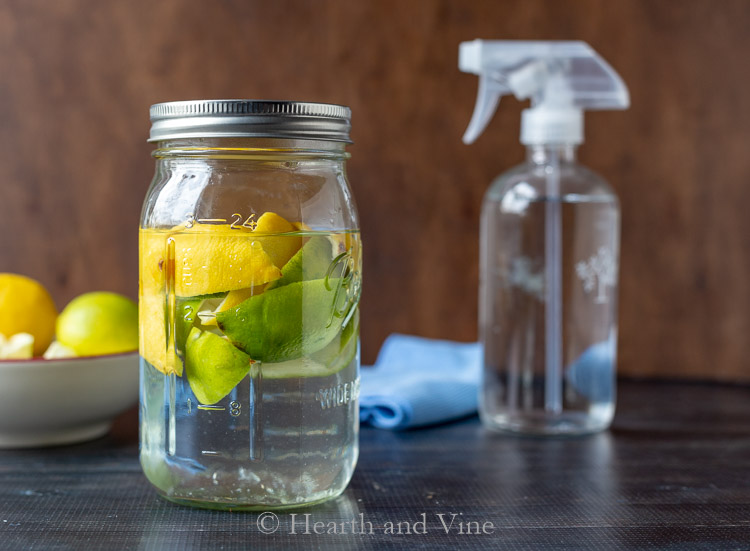
Simply place the peels, (no fruit) into a large mason jar, or any large clean jar, and cover with white vinegar.
I love lemon and lime peels but you could easily use peels from clementines and oranges which you are probably already eating during the winter. Don't throw them out. Instead, collect them and add them to a jar. Then pour white vinegar over top.
After about a week or so you can pour the scented vinegar into a spray bottle.
I like to use a mix of 1/2 vinegar to 1/2 water. You could use it straight without added water, or you could mix 1/3 vinegar to 2/3 water if you prefer it a little more diluted.
Why Homemade Lemon Vinegar?
- White vinegar contains acetic acid and does a great job of cutting through soap residue, and hard water/mineral deposits. It's strong enough to kill some germs but does not stand up to the big boys like salmonella.
- Adding the scent of lemon makes it smell so much better.
- Chances are you probably already have white vinegar in the pantry for cooking. I love it for pickled vegetables.
- Even if you don't an entire gallon of white vinegar costs around $2-3.00.
- You know exactly what's in it. No weird chemicals here.
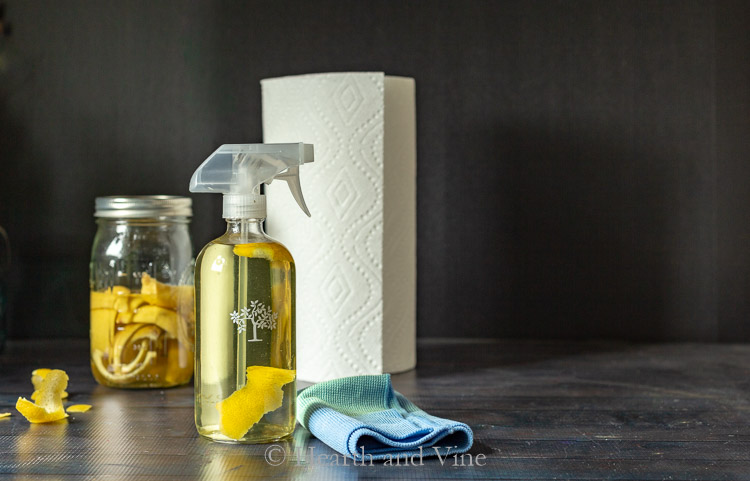
General Uses:
- Cleaning windows and glass
- Wiping down chrome in kitchen and bathroom fixtures
- Cleaning the microwave
- Cleaning kitchen drains. Add a little baking soda first. Then pour in some vinegar and watch the reaction.
- Removing deposits on shower heads. Place some in a baggie and immerse a showerhead inside. Attach with a rubber band and leave on for a few hours.
- Removing glue and sticky labels.
Places to Avoid Using Vinegar
- Stone countertops and floors such as granite, marble, soapstone. I have a great recipe for a countertop cleaner that you can use instead.
- Wood furniture or floors.
- Tile grout.
The next time you are peeling a lemon, orange, lime or other citrus fruit, consider keeping the peels and making your own handy homemade scented vinegar cleaner.

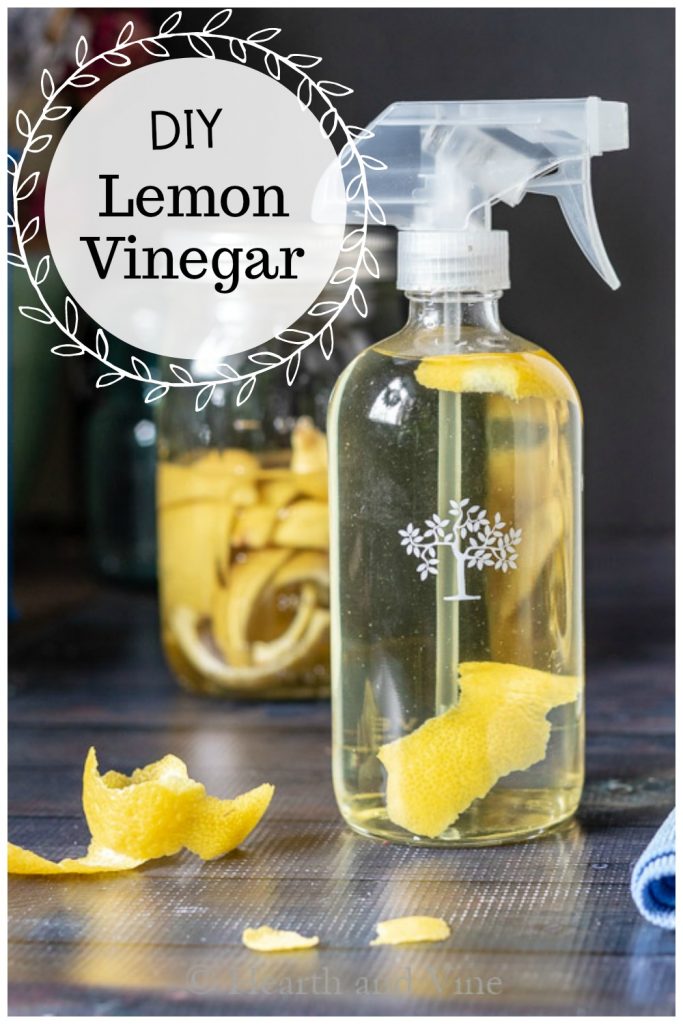
How to Make Homemade Lemon Vinegar for Cleaning
Materials
- Lemon peels
- White vinegar
- Water
- Mason Jar
- Spray Bottle
Instructions
- Place the lemon peels in a large mason jar.
- Pour vinegar into the mason jar to cover the lemons.
- Let sit for about a week.
- Pour the scented vinegar into a spray bottle.
- Use it straight without added water, or mix 1/3 vinegar to 2/3 water if you prefer.


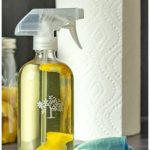


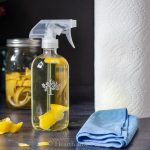
Neil
Hi, can I double-check: does this need to be kept in the fridge or not? I took all the peel out and then poured the liquid through a sieve into a spray bottle, so I tried as much as I could to get all the bits out. So, no need to refrigerate that? I'm using a spray bottle that isn't transparent, so I won't be easily able to see if it's going mouldy or not. Cheers!
Patti Estep
Hi Neil. I have never put my lemon vinegar in the fridge and have had no problems. That being said you never know when a little bacteria could get in. However, I think the acidic nature of the vinegar would deter it from growing mold.
Diane
I did this using lemon , lime and grapefruit. Cleans great. Those citrus oils are also powerful cleaners.
Patti Estep
That's great to hear Diane. Thanks for sharing.
Maya
How long does the vinegar solution (with the soaked lemon peel) last? Is there any difference in soaking it for 2,4 6, or even 8 months (potency-wise or in terms of effectiveness)?
Patti Estep
Maya, I don't think soaking the peels for longer than a month makes it any stronger.
Georgia Hadjicosta
Hi,I love the lemon vinegar spray.I stop use chemicals for 7years.Now,I only use homemade sprays,and cleaners.I also use orange peels.Also,in my bathroom spray bottle, water,alcohol and 1/2 dawn soap,I add a peel of lemon. THANKS, FOR YOU AMAZING TIPS.
Patti Estep
Thanks for sharing Georgia!
Melissa
Does the spray bottle with vinegar and lemon peels need to be refrigerated? It won’t go bad with the lemon peels in there?
Patti Estep
Melissa, the couple of pieces that I put in the spray bottle are purely decorative and not needed. That being said they have been in there for several months and look fine. Perhaps all the vinegar is acting as a preservative. If you are worried, leave them out.
Jackie
Your pictures are beautiful. Great ideas too
Patti Estep
Thank you Jackie. I'm glad you like it.
Alicia
Awesome post Patti. I just got a glass spray bottle and wasn't sure what to put in iy. This is so simple and natural. Thanks for sharing.
Patti Estep
Thanks Alicia. It's a good one to have on hand.
Carole
I've always just used straight vinegar for the windows and I have to say the smell drives me nuts. Adding the citrus is a prefect solution. Going to start saving my peels this week so I can make a spray bottle of this. Thanks!
Krystal
Vinegar is always a must for cleaning! Especially cages- Apple cider vinegar is perfect for getting odors out of cages.
Patti Estep
Thanks Krystal. That's good to know.